【单元一遍过】Unit 1 The Changing World复习课件(共37张PPT)
文档属性
| 名称 | 【单元一遍过】Unit 1 The Changing World复习课件(共37张PPT) |  | |
| 格式 | pptx | ||
| 文件大小 | 843.9KB | ||
| 资源类型 | 教案 | ||
| 版本资源 | 仁爱科普版 | ||
| 科目 | 英语 | ||
| 更新时间 | 2023-07-13 10:54:45 | ||
图片预览

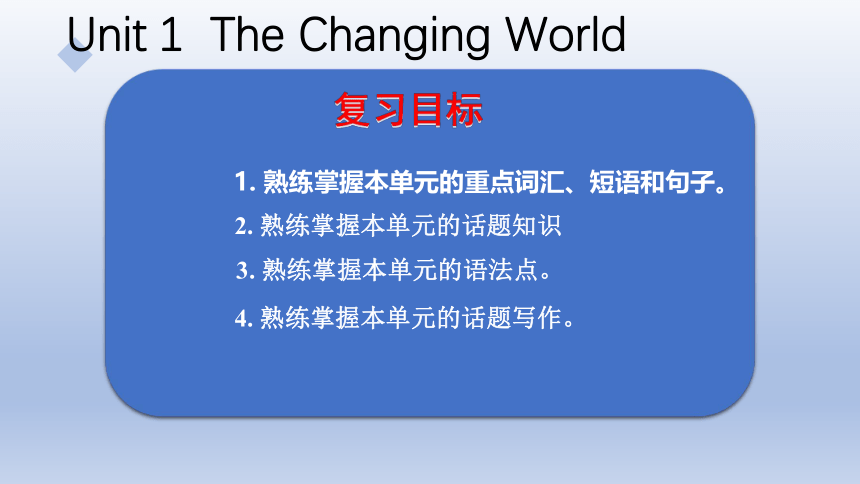

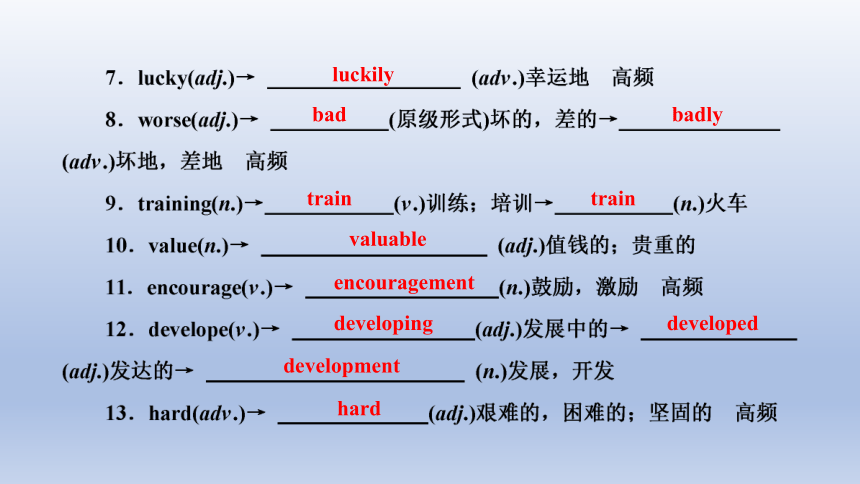

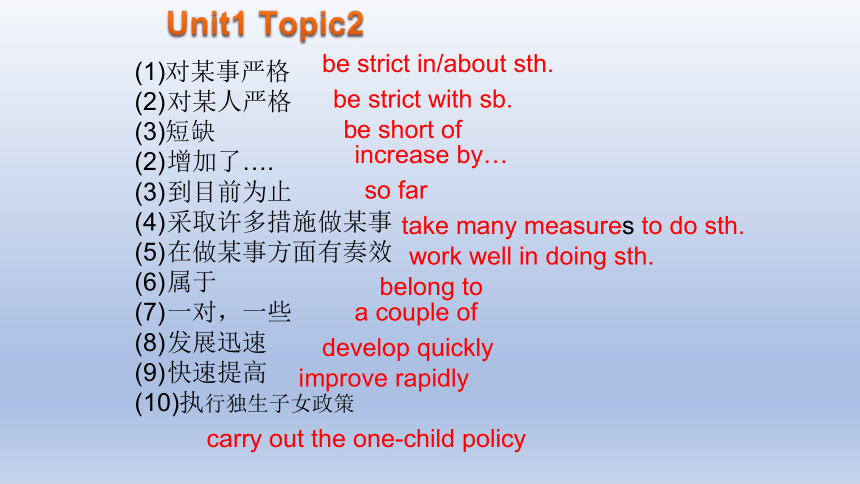
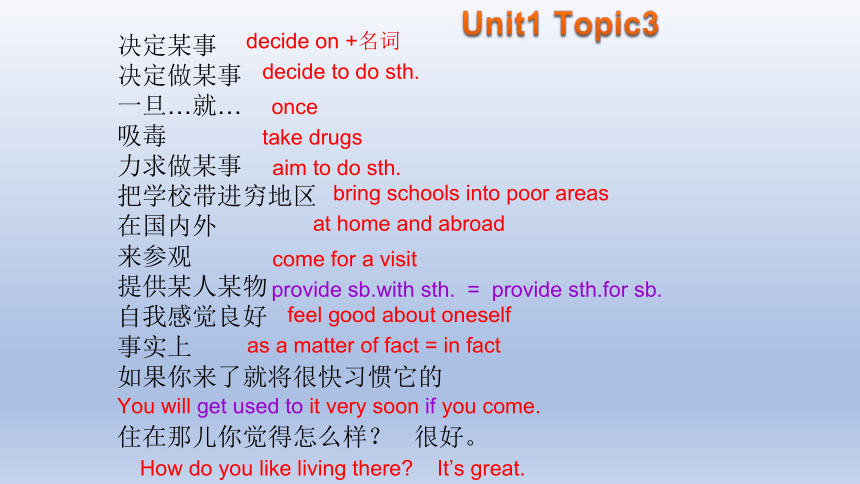

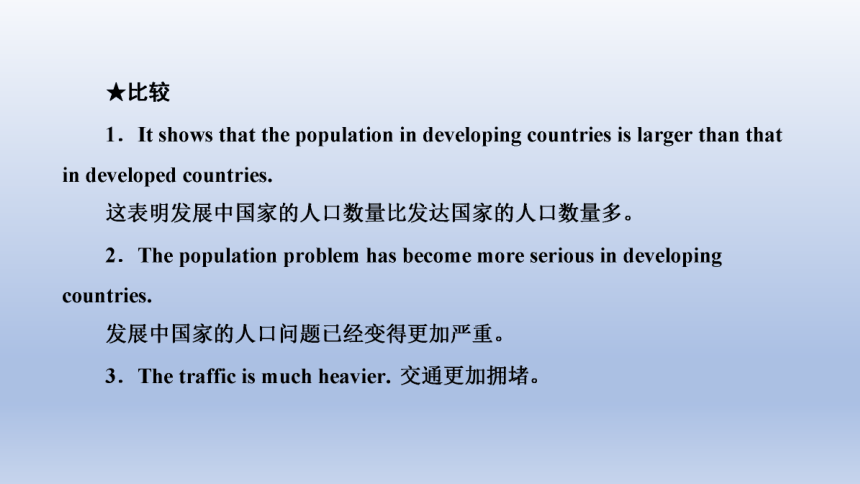
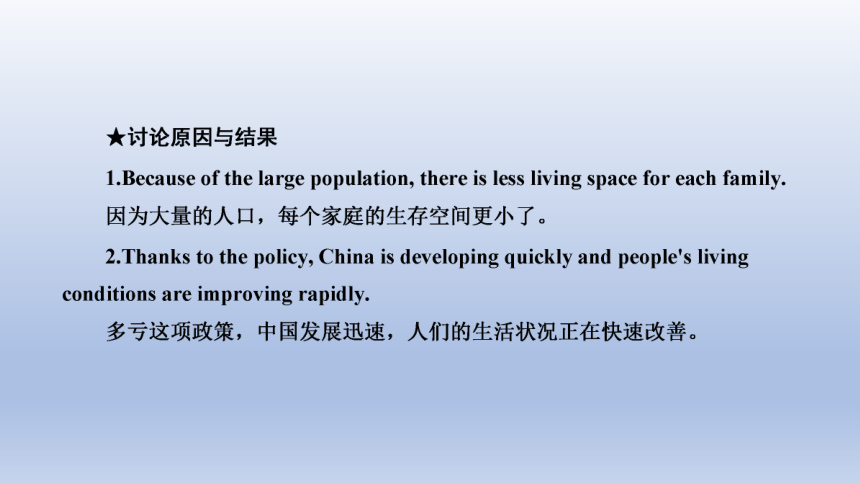


文档简介
(共37张PPT)
仁爱版九年级上册
Unit 1 The Changing World
目录页
1、单击此处添加标题
2、单击此处添加标题
3、单击此处添加标题
4、单击此处添加标题
5、单击此处添加标题
复习目标
1. 熟练掌握本单元的重点词汇、短语和句子。
3. 熟练掌握本单元的语法点。
4. 熟练掌握本单元的话题写作。
2. 熟练掌握本单元的话题知识
Unit 1 The Changing World
温习梳理教材
词汇拓展
shut
satisfied
medicine
rapidly
probable
natural
naturally
luckily
bad
badly
train
train
valuable
encouragement
developing
developed
development
hard
1.考虑做某事
2.多亏了……
3.亲眼看见
4.真的么?
5.过上艰苦的生活
6.有一个好机会做某事
7.与某人联系
8.远方亲戚
9.在某方面取的进步
10.成功做成某事
11.现在北京的路发生了什么变化?
consider doing sth.
thanks to +名词/doing sth.
see sth.oneself
Is that so /Really
have / live a hard life
have a good chance to do sth.
keep in touch with…
relatives far away
make (great) progress in +名词
succeed in doing sth./ be successful in doing sth.
What has happened to Beijing’s roads nowadays
Unit1 Topic1
重点短语
Unit1 Topic2
(1)对某事严格
对某人严格
(3)短缺
增加了….
到目前为止
采取许多措施做某事
在做某事方面有奏效
属于
一对,一些
发展迅速
快速提高
执行独生子女政策
be strict in/about sth.
be strict with sb.
be short of
increase by…
so far
take many measures to do sth.
work well in doing sth.
belong to
a couple of
develop quickly
improve rapidly
carry out the one-child policy
决定某事
决定做某事
一旦…就…
吸毒
力求做某事
把学校带进穷地区
在国内外
来参观
提供某人某物
自我感觉良好
事实上
如果你来了就将很快习惯它的
住在那儿你觉得怎么样? 很好。
decide on +名词
decide to do sth.
once
take drugs
aim to do sth.
bring schools into poor areas
at home and abroad
come for a visit
feel good about oneself
as a matter of fact = in fact
You will get used to it very soon if you come.
How do you like living there It’s great.
provide sb.with sth. = provide sth.for sb.
Unit1 Topic3
重点句子
2b Work in groups and find out the differences between have/has been to and have/has gone to.
sb. have/has gone to … 某人去……了(去而未归)
sb. have/has been to … 某人去过……(去而复返)
has gone to
have been in
has been to
Present Perfect (I)
用法:表示过去发生或已经完成的某一动作对现在造成的
影响或结果。
构成:助动词have/has + 动词的过去分词
(1) 肯定句:主语+have/has +过去分词+其它
e.g. We have seen the film.
(2) 否定句:主语+haven’t/hasn’t +过去分词+其它。
e.g. We haven’t seen the film.
(3) 一般疑问句:Have/Has +主语 +过去分词+其它?
e.g. Have you seen the film
have cleaned the clothes
past
now
表示过去发生的某一动作对现在造成的影响或结果。
e.g. I have just cleaned my clothes. 我刚洗过衣服。
(“洗衣服”是发生在过去的动作,对现在造成的结
果是“衣服干净了”。)
e.g. I have just had my breakfast. 我刚吃过早饭。
(对现在的影响是“不饿”。)
cleaned the clothes
Present Perfect (II)
常与 just, already, yet, never, ever 等副词连用。
She has been a high school student for two years.
My teacher has worked in the school since 2010 .
for + 时间段
since + 时间点
Present Perfect
e.g. I have been in the new school for a week.
for a week
last week
present
past
for + 时间段
e.g. She works in the school since 1995.
since 1995
lived
present
past
since +时间点
e.g. He has waited for Tom since two hours ago.
since two hours ago
8:00
present
past
since + 时间段+ago
10:00
since 8:00
The woman left home at 8:00.
for 2 hours
8:00
present
10:00
past
短暂性动词 → 延续性动词
leave → be away from
She has been away from home since 8:00.
= She has been away from home for 2 hours.
一,一般过去时常用的时间是:last+时间, 一 段时间+ago,
yesterday, the day before yesterday
例如:He visited his parents yesterday.
二,现在完成时的“未完成”用法。
本用法表示动作或状态从过去某时开始,延续至今,可能结束,也可能继续下去。常与for短语,since 短语或since从句连用,可以用how long提问。谓语动词用延续性动词。
1,一般过去时的句子改为现在完成时的句子。
短暂性动词→延续性动词
borrow → become →
die → open →
buy → close →
join → marry →
begin/start → fall ill →
come to → get up →
leave /go → end →
keep
be dead
have
be a member of/be in
be on
be in/at
be away (from)
be
be open
be closed
be married
be ill
be up
be over
put on→ fall asleep→
catch a cold→
2,一般过去时的时间→现在完成时的时间
at 8:00 →
last year→
yesterday →
two days ago→
3,一般时的句子变成现在完成时的句子。
(1)He bought the VCD yesterday.
(2)She borrowed this book three days ago.
(3)He left the park at 8:00.
wear
have a cold
be asleep
since 8:00
for one year /since last year
for one day /since yesterday
for two days /since two days ago
He has had the VCD since yesterday./for one day.
She has kept this book for three days ./since three days ago.
He has been away from the park since 8 o’clock.
方向一 根据时间状语标志词确定时态
动词的时态常与特定的时间状语紧密联系,例如,由so far, in the past two years, till now可判断句子的时态用现在完成时;由yesterday, just now可判断句子的时态用一般过去时等。
方向二 根据固定句型与时态之间的关系确定时态
在英语中,不少句型与一些动词在时态的运用方面都存在着特定的对应关系,如:
(1)在“祈使句+and/or+陈述句”句型中,陈述句与will连用表示一般将来时;
(2)was/were doing...when...,when分句的谓语动词用一般过去时;
(3)在一个含有时间状语从句的主从复合句中,如果主从句的谓语动词都是过去发生的动作,一般来说,表示短暂性动作的动词用一般过去时,表示持续性动作的动词用过去进行时。
方向三 根据句意和语境确定时态
大多数时候,动词的时态是由前后句、上下文语境来决定的。要求考生一方面熟记各种时态的用法,另一方面要注意前后语境间的潜在提示。
倒装句用法
So do I . (so+ be/助动词/情态动词+主语)
(前面提到的肯定情况同样适合另外一个主语。“我也是这样”)
Neither/Nor do I. ( Neither/Nor + be/助动词/情态动词+主语)
(前面提到的否定情况同样适合于另外一个主语。“我也不这样”)
⑴-Tom is a kind man. -So____I.
-The children should come earlier. -So______they.
-Kangkang plays football well. -So______we.
-They visited the farm. -So______he.
-I have been to Beijing. -So______he.
-Mike will leave here. -So______Maria.
⑵-She isn’t a good worker. -Neither /Nor_____I.
-He won’t go swimming. -Neither ______we.
-They have never been to Fuzhou. -Neither______he.
-We can’t go to the cinema. -Neither ______they.
am
should
do
did
has
will
am
will
has
can
分数,百分数用法
⑴分数:分子用基数词,分母用序数词,分子大于1,分母用复数形式。例如:
one third 1/3, two thirds 2/3, a quarter1/4,
three quarters 3/4 , a half/one half
(2)分数+ of + 名词:Three fifths of students are girls.
Three fifths of the population is Chinese.
(3)百分数:基数词+percent”
thirty percent 30%
(4)百分数+of +名词:
China has 20 percent of the world’s population.
millions of 用法:
在英语中hundred , thousand , million , billion等词,当其前面有数词时,它们不加 “s”使用,其后也不用介词of .直接跟可数名词的复数形式。 如:five million people 五百万人
当表达不确定数字时,在它们后面加上 “s”再加介词of使用。后接可数名词的复数形式,表示 “数百” “数千” “数百万” “数十亿”。如:
millions of people 数百万人
make a contribution to+名词/代词/doing sth. 为……作贡献
encourage
v.鼓励
encourage sb. to do sth.
development
n.发展,开发
develop v.发展,开发
Language Points
paragraph 3
1. Project Hope has made important contributions to both the education and the health of children.希望工程为儿童的教育和健康都做出了重大贡献。
2. For more than 20 years, Project Hope has encouraged the moral development and modern thinking of students. 20多年来,希望工程鼓励了孩子的道德发展和现代意识。
learn ...from … 从……中学习
e.g. I’ve learnt a lot from the story.
我从这个故事中学到了很多。
Language points
have (no) time to do sth. 有(没有)时间做某事
e.g. He was so busy that he had no time to have lunch.
他太忙了,没有时间吃午饭。
3. Though I had no time to travel, I still felt very happy. 虽然我没有时间去旅行,但我仍然感到很开心。
though/although
even though/even if
e.g. Though/Although it was very late, the workers
went on working.
虽然很晚了,但是工人们继续工作。
虽然,尽管,即使
让步状语从句
通常不与but连用
Functions
It is increasing _____ 90 million every year.
by
6800
80
80
80
increase by 增加了……
increase to 增加到……
ever
who
where
when
how
what
value
v.重视,珍视
n.价值
valuable adj. 有价值的
Whatever
pron.无论什么,不管什么
无论
什么
怎么样
什么时候
哪里
谁
New words
话题一:
仁爱版九年级上册
Unit 1 The Changing World
目录页
1、单击此处添加标题
2、单击此处添加标题
3、单击此处添加标题
4、单击此处添加标题
5、单击此处添加标题
复习目标
1. 熟练掌握本单元的重点词汇、短语和句子。
3. 熟练掌握本单元的语法点。
4. 熟练掌握本单元的话题写作。
2. 熟练掌握本单元的话题知识
Unit 1 The Changing World
温习梳理教材
词汇拓展
shut
satisfied
medicine
rapidly
probable
natural
naturally
luckily
bad
badly
train
train
valuable
encouragement
developing
developed
development
hard
1.考虑做某事
2.多亏了……
3.亲眼看见
4.真的么?
5.过上艰苦的生活
6.有一个好机会做某事
7.与某人联系
8.远方亲戚
9.在某方面取的进步
10.成功做成某事
11.现在北京的路发生了什么变化?
consider doing sth.
thanks to +名词/doing sth.
see sth.oneself
Is that so /Really
have / live a hard life
have a good chance to do sth.
keep in touch with…
relatives far away
make (great) progress in +名词
succeed in doing sth./ be successful in doing sth.
What has happened to Beijing’s roads nowadays
Unit1 Topic1
重点短语
Unit1 Topic2
(1)对某事严格
对某人严格
(3)短缺
增加了….
到目前为止
采取许多措施做某事
在做某事方面有奏效
属于
一对,一些
发展迅速
快速提高
执行独生子女政策
be strict in/about sth.
be strict with sb.
be short of
increase by…
so far
take many measures to do sth.
work well in doing sth.
belong to
a couple of
develop quickly
improve rapidly
carry out the one-child policy
决定某事
决定做某事
一旦…就…
吸毒
力求做某事
把学校带进穷地区
在国内外
来参观
提供某人某物
自我感觉良好
事实上
如果你来了就将很快习惯它的
住在那儿你觉得怎么样? 很好。
decide on +名词
decide to do sth.
once
take drugs
aim to do sth.
bring schools into poor areas
at home and abroad
come for a visit
feel good about oneself
as a matter of fact = in fact
You will get used to it very soon if you come.
How do you like living there It’s great.
provide sb.with sth. = provide sth.for sb.
Unit1 Topic3
重点句子
2b Work in groups and find out the differences between have/has been to and have/has gone to.
sb. have/has gone to … 某人去……了(去而未归)
sb. have/has been to … 某人去过……(去而复返)
has gone to
have been in
has been to
Present Perfect (I)
用法:表示过去发生或已经完成的某一动作对现在造成的
影响或结果。
构成:助动词have/has + 动词的过去分词
(1) 肯定句:主语+have/has +过去分词+其它
e.g. We have seen the film.
(2) 否定句:主语+haven’t/hasn’t +过去分词+其它。
e.g. We haven’t seen the film.
(3) 一般疑问句:Have/Has +主语 +过去分词+其它?
e.g. Have you seen the film
have cleaned the clothes
past
now
表示过去发生的某一动作对现在造成的影响或结果。
e.g. I have just cleaned my clothes. 我刚洗过衣服。
(“洗衣服”是发生在过去的动作,对现在造成的结
果是“衣服干净了”。)
e.g. I have just had my breakfast. 我刚吃过早饭。
(对现在的影响是“不饿”。)
cleaned the clothes
Present Perfect (II)
常与 just, already, yet, never, ever 等副词连用。
She has been a high school student for two years.
My teacher has worked in the school since 2010 .
for + 时间段
since + 时间点
Present Perfect
e.g. I have been in the new school for a week.
for a week
last week
present
past
for + 时间段
e.g. She works in the school since 1995.
since 1995
lived
present
past
since +时间点
e.g. He has waited for Tom since two hours ago.
since two hours ago
8:00
present
past
since + 时间段+ago
10:00
since 8:00
The woman left home at 8:00.
for 2 hours
8:00
present
10:00
past
短暂性动词 → 延续性动词
leave → be away from
She has been away from home since 8:00.
= She has been away from home for 2 hours.
一,一般过去时常用的时间是:last+时间, 一 段时间+ago,
yesterday, the day before yesterday
例如:He visited his parents yesterday.
二,现在完成时的“未完成”用法。
本用法表示动作或状态从过去某时开始,延续至今,可能结束,也可能继续下去。常与for短语,since 短语或since从句连用,可以用how long提问。谓语动词用延续性动词。
1,一般过去时的句子改为现在完成时的句子。
短暂性动词→延续性动词
borrow → become →
die → open →
buy → close →
join → marry →
begin/start → fall ill →
come to → get up →
leave /go → end →
keep
be dead
have
be a member of/be in
be on
be in/at
be away (from)
be
be open
be closed
be married
be ill
be up
be over
put on→ fall asleep→
catch a cold→
2,一般过去时的时间→现在完成时的时间
at 8:00 →
last year→
yesterday →
two days ago→
3,一般时的句子变成现在完成时的句子。
(1)He bought the VCD yesterday.
(2)She borrowed this book three days ago.
(3)He left the park at 8:00.
wear
have a cold
be asleep
since 8:00
for one year /since last year
for one day /since yesterday
for two days /since two days ago
He has had the VCD since yesterday./for one day.
She has kept this book for three days ./since three days ago.
He has been away from the park since 8 o’clock.
方向一 根据时间状语标志词确定时态
动词的时态常与特定的时间状语紧密联系,例如,由so far, in the past two years, till now可判断句子的时态用现在完成时;由yesterday, just now可判断句子的时态用一般过去时等。
方向二 根据固定句型与时态之间的关系确定时态
在英语中,不少句型与一些动词在时态的运用方面都存在着特定的对应关系,如:
(1)在“祈使句+and/or+陈述句”句型中,陈述句与will连用表示一般将来时;
(2)was/were doing...when...,when分句的谓语动词用一般过去时;
(3)在一个含有时间状语从句的主从复合句中,如果主从句的谓语动词都是过去发生的动作,一般来说,表示短暂性动作的动词用一般过去时,表示持续性动作的动词用过去进行时。
方向三 根据句意和语境确定时态
大多数时候,动词的时态是由前后句、上下文语境来决定的。要求考生一方面熟记各种时态的用法,另一方面要注意前后语境间的潜在提示。
倒装句用法
So do I . (so+ be/助动词/情态动词+主语)
(前面提到的肯定情况同样适合另外一个主语。“我也是这样”)
Neither/Nor do I. ( Neither/Nor + be/助动词/情态动词+主语)
(前面提到的否定情况同样适合于另外一个主语。“我也不这样”)
⑴-Tom is a kind man. -So____I.
-The children should come earlier. -So______they.
-Kangkang plays football well. -So______we.
-They visited the farm. -So______he.
-I have been to Beijing. -So______he.
-Mike will leave here. -So______Maria.
⑵-She isn’t a good worker. -Neither /Nor_____I.
-He won’t go swimming. -Neither ______we.
-They have never been to Fuzhou. -Neither______he.
-We can’t go to the cinema. -Neither ______they.
am
should
do
did
has
will
am
will
has
can
分数,百分数用法
⑴分数:分子用基数词,分母用序数词,分子大于1,分母用复数形式。例如:
one third 1/3, two thirds 2/3, a quarter1/4,
three quarters 3/4 , a half/one half
(2)分数+ of + 名词:Three fifths of students are girls.
Three fifths of the population is Chinese.
(3)百分数:基数词+percent”
thirty percent 30%
(4)百分数+of +名词:
China has 20 percent of the world’s population.
millions of 用法:
在英语中hundred , thousand , million , billion等词,当其前面有数词时,它们不加 “s”使用,其后也不用介词of .直接跟可数名词的复数形式。 如:five million people 五百万人
当表达不确定数字时,在它们后面加上 “s”再加介词of使用。后接可数名词的复数形式,表示 “数百” “数千” “数百万” “数十亿”。如:
millions of people 数百万人
make a contribution to+名词/代词/doing sth. 为……作贡献
encourage
v.鼓励
encourage sb. to do sth.
development
n.发展,开发
develop v.发展,开发
Language Points
paragraph 3
1. Project Hope has made important contributions to both the education and the health of children.希望工程为儿童的教育和健康都做出了重大贡献。
2. For more than 20 years, Project Hope has encouraged the moral development and modern thinking of students. 20多年来,希望工程鼓励了孩子的道德发展和现代意识。
learn ...from … 从……中学习
e.g. I’ve learnt a lot from the story.
我从这个故事中学到了很多。
Language points
have (no) time to do sth. 有(没有)时间做某事
e.g. He was so busy that he had no time to have lunch.
他太忙了,没有时间吃午饭。
3. Though I had no time to travel, I still felt very happy. 虽然我没有时间去旅行,但我仍然感到很开心。
though/although
even though/even if
e.g. Though/Although it was very late, the workers
went on working.
虽然很晚了,但是工人们继续工作。
虽然,尽管,即使
让步状语从句
通常不与but连用
Functions
It is increasing _____ 90 million every year.
by
6800
80
80
80
increase by 增加了……
increase to 增加到……
ever
who
where
when
how
what
value
v.重视,珍视
n.价值
valuable adj. 有价值的
Whatever
pron.无论什么,不管什么
无论
什么
怎么样
什么时候
哪里
谁
New words
话题一:
同课章节目录
- Unit 1 Making new friends
- Topic 1 Welcome to China!
- Topic 2 Where are you from?
- Topic 3 How old are you?
- Unit 2 Looking different
- Topic 1 I have a small nose
- Topic 2 What does she look like?
- Topic 3 Whose jacket is this?
- Unit 3 Getting togethe
- Topic 1 Does he speak Chinese?
- Topic 2 What do your parents do?
- Topic 3 What would you like to drink?
- Unit 4 Having fun
- Topic 1 What can I do for you?
- Topic 2 Would you like to cook with us?
- Topic 3 What time is it now?
